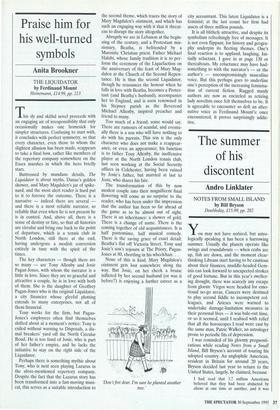Praise him for his well-turned symbols
Anita Brookner
THE LIQUIDATOR by Ferdinand Mount Heinemann, £14.99, pp. 213 This sly and skilful novel proceeds with an engaging air of irresponsibility that only occasionally makes one homesick for simpler structures. Confusing to start with, it concludes with perfect symmetry, so that every character, even those to whom the slightest allusion has been made, reappears to take a final bow, rather like members of the repertory company somewhere on the Essex marshes in which the hero briefly stars.
Buttressed by mundane details, The Liquidator is about myths, Danae's golden shower, and Mary Magdalen's jar of spike- nard, and the most alert reader is hard put to it to foresee the outcome. There is a narrative — indeed there are several and there is a most reliable narrator, so reliable that even when he is not present he is in control. And, above all, there is a sense of destiny or fate, so that all histories are circular and bring one back to the point of departure, which is a tennis club in North London, still there at the end, having undergone a modish conversion entirely in tune with the spirit of the times.
The key characters — though there are so many — are Tony Allenby and Josie Pagan-Jones, with whom the narrator is a little in love. Since they are so graceful and attractive a couple, he is in love with both of them. She is the daughter of Geoffrey Pagan-Jones who is the original Liquidator, a city financier whose gleeful plotting extends to many enterprises, not all of them financial.
Tony works for the firm, but Pagan- Jones's employees often find themselves shifted about at a moment's notice: Tony is exiled without warning to Disposals, a dis- mal breakers' yard off the North Circular Road. He is too fond of Josie, who is part of her father's empire, and he lacks the initiative to stay on the right side of the Liquidator.
Perhaps there is something mythic about Tony, who is next seen playing Lazarus in the afore-mentioned repertory company. Despite the fact that the Lazarus story has been transformed into a fast-moving musi- cal, this serves as a suitable introduction to the second theme, which traces the story of Mary Magdalen's ointment, and which has such an engaging way with it that it threat- ens to disrupt the story altogether.
Abruptly we are in Lebanon at the begin- ning of the century, and a Protestant mis- sionary, Beatha, is befriended by a Maronite Christian priest, Father Michael Halabi, whose family tradition it is to per- form the ceremony of the Liquefaction on the anniversary of the feast of Mary Mag- dalen at the Church of the Second Repen- tance. He is thus the second Liquidator, though he renounces the honour when he falls in love with Beatha, becomes a Protes- tant (and Beatha's husband), accompanies her to England, and is soon renowned in his Stepney parish as the Reverend Michael Allenby, inspired preacher and friend to many.
Too much of a friend, some would say. There are rumours of scandal, and eventu- ally there is a son who will have nothing to do with his parents. This son is the only character who does not make a reappear- ance, or even an appearance; his function is to father Tony Allenby, the inoffensive player at the North London tennis club, last seen working at the Social Security offices in Colchester, having been ruined by Josie's father, but married at last to Josie, who shares his fate.
The transformation of this by now modest couple into their magnificent final flowering will come as no surprise to the reader, who has been under the impression that the author has been so far ahead of the game as to be almost out of sight. There is an inheritance: a shower of gold. There is a change of name. There is the coming together of old acquaintances. It is half pantomime, half musical comedy. There is the saving grace of exact detail: Beatha's flat off Victoria Street, Tony and Josie's son's sojourn at The Priory, Pagan- Jones at 80, chortling in his wheelchair.. .
None of this is kind. Mary Magdalen's ointment gets lost somewhere along the way. But Josie, on her cheek a bruise inflicted by her second husband (or was it before?) is enjoying a further career as a 'Don't fret dear. I'm sure he planted another free.' city accountant. This latest Liquidator is a feminist; at the last count her firm had assets of three million pounds.
It is all blithely attractive, and despite its symbolism refreshingly free of messages. It is not even flippant, for history and geogra- phy underpin its fleeting themes. One's final reaction is to applaud, laughing. Ini- tially reluctant, I gave in at page 130 or thereabouts. My reluctance may have had- something to with the narrator's — or the author's — uncompromisingly masculine voice. But this perhaps goes to underline one's perception of the increasing feminisa- tion of current fiction. Rugged manly authors are now as encircled as retiring lady novelists once felt themselves to be. It is agreeable to encounter so deft an alter- native voice as Ferdinand Mount's: once encountered, it proves surprisingly addic- tive.


































































 Previous page
Previous page